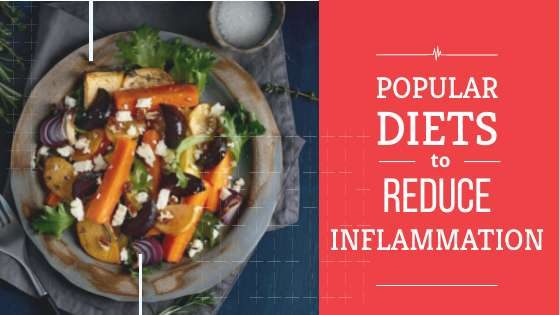Inflammation is a major cause of disease and illness and you can follow many diets to reduce inflammation. It causes everything from heart attacks to cancer. But diet has a huge impact on reducing inflammation. In fact, certain foods can help prevent chronic diseases such as diabetes, rheumatoid arthritis, and even Alzheimer’s.
There are many diet plans out there designed to help you lose weight and get healthy. But most of these diets focus on reducing calories and fat intake. They also tend to be very restrictive and difficult to stick with.
This article will introduce you to 10 different diets that can be followed to reduce inflammation. These diets are of course designed to help people with specific goals like weight loss or managing celiac disease or diabetes. The concept of these diets is more or less similar wherein the idea is to reduce inflammation-causing agents in your food.
So, following any of the below-mentioned diets will help reduce inflammation.
Table of Contents
Mediterranean Diet
The Mediterranean diet is rich in fruits, vegetables, whole grains, nuts, fish, olive oil, beans, poultry, and dairy. This healthy diet contains many anti-inflammatory foods, including omega-3 fatty acids, antioxidants, fiber, vitamins, minerals, and phytochemicals.
One of the main reasons that the Mediterranean Diet is so effective is because it includes olive oil. Olive oil contains antioxidants that protect cells against damage caused by free radicals. These compounds also boost metabolism, helping to burn calories faster.
This diet reduces inflammation throughout the body, including the brain. Inflammation is associated with many diseases, including heart disease, diabetes, cancer, arthritis, Alzheimer’s, depression, and obesity. So, eating this diet may help prevent these diseases.
DASH Diet
The Dietary Approaches to Stop Hypertension (or DASH) diet is a healthy eating plan designed to help lower blood pressure. It includes plenty of fruits, vegetables, whole grains, nuts, fish, poultry, beans, and dairy foods.
This diet is rich in potassium, magnesium, calcium, fiber, vitamins C and E, folate, iron, zinc, omega-3 fatty acids, and antioxidants. It’s also low in saturated fat, cholesterol, sodium, and added sugars.
While there isn’t a single food that makes this diet unique, it does contain several nutrients that may be beneficial to those who suffer from chronic inflammation. These include potassium, magnesium, vitamin B6, vitamin K, copper, manganese, niacin, pantothenic acid, riboflavin, thiamine, and vitamin C.

MIND Diet
The MIND diet is a simple eating plan designed to help prevent Alzheimer’s disease. It was developed by researchers at Rush University Medical Center in Chicago.
There are several diets that claim to reduce inflammation, including the MIND diet. It focuses on reducing foods that contribute to inflammation while increasing fruits and vegetables.
This diet focuses on foods that contain omega-3 fatty acids (fish, walnuts, flaxseed), antioxidants (blueberries, spinach) and fiber (whole grains). The goal is to eat a lot of these healthy foods and avoid processed food, red meat, fried foods, refined sugars and trans fats.
This diet is based on research showing that certain foods can trigger inflammatory responses in our bodies. Inflammation is linked to heart disease, diabetes, obesity, cancer, Alzheimer’s disease, arthritis, and other health conditions.
Paleo Diet
Paleo diets are popular among health enthusiasts because they’re considered healthier than traditional diets. They emphasize eating foods that were available during the Paleolithic era (the period between 2 million and 10,000 years ago). These include meat, fish, vegetables, leafy greens, fresh fruits, nuts, seeds, eggs, dairy, and some grains.
The paleo diet emphasizes whole foods over processed foods, so avoid refined sugars, white flour, and hydrogenated oils. Also, limit alcohol consumption to one drink per day. This helps reduce inflammation.
KETO Diet
The ketogenic diet (also known as the keto diet) is a very popular diet plan that focuses on eating only foods that are rich in healthy fats, moderate amounts of protein, and low amounts of carbohydrates.
This type of diet works well for reducing inflammation because it causes ketosis, which reduces inflammation. Ketosis occurs when there isn’t enough glucose (blood sugar) available to fuel cells in the body. Glucose is needed to produce energy, but not when we’re trying to fight inflammation.
Atkins Diet
The Atkins Diet is a popular weight loss plan that focuses on cutting out carbohydrates. This helps reduce inflammation in the body, which may help prevent heart disease and diabetes.
This diet includes meat, eggs, cheese, butter, cream, nuts, seeds, vegetables, fruits, and some types of fish. However, there are many variations of this diet, including vegetarian versions, and some diets include dairy.
Gluten-Free Diet
The gluten-free diet is becoming increasingly popular because it helps reduce inflammation and improve health.
The gluten-free diet is a popular option among those who suffer from celiac disease. Celiac disease is an autoimmune disorder where the body attacks itself after ingesting gluten. Gluten is found in wheat, barley and rye. There are however many drawbacks of going gluten free, be aware of those as well.
Whole30 Diet
The Whole30 Diet is a popular program designed to help people lose weight and improve health. It involves eating only foods that are naturally gluten free, dairy free, and refined sugar free. Many people find this diet restrictive, but it does offer some benefits.
This diet plan helps reduce inflammation, which may be linked to many diseases including heart disease, diabetes, arthritis, and cancer. Also, it provides a number of nutritional benefits, including improved digestion, better sleep, and reduced stress.
South Beach Diet
The South Beach Diet (SBD) was created by Dr. Arthur Agatston, M.D., Ph.D., who wrote the book, The South Beach Diet. He developed this plan after he realized that many patients were not able to lose weight because they had inflammatory diseases, such as arthritis, diabetes, heart disease, and cancer.
Dr. Agatston found that these conditions cause chronic inflammation throughout the body, making it harder to lose weight. So he came up with a diet plan that focuses on foods that reduce inflammation, including fish, olive oil, nuts, fruits, vegetables, beans, whole grains, and lean meats.
This diet plan is very similar to the Mediterranean Diet, except that it emphasizes plant-based foods instead of animal-based ones. This makes sense since plants contain fewer calories than animals.
Vegetarian Diet
The vegetarian diet is a great option for anyone who wants to reduce inflammation in their body. Inflammation is a major cause of disease and discomfort, including arthritis, asthma, heart disease, diabetes, cancer, Alzheimer’s, depression, and many others.
There are several reasons why a vegetarian can be one of the diets to reduce inflammation. First, meat is very high in saturated fat, which increases cholesterol levels and leads to plaque buildup in arteries. Second, meat is loaded with hormones and antibiotics, which can lead to hormone imbalances and antibiotic resistance. Third, meat causes digestive problems because it requires the digestion of protein, which takes longer than digesting carbohydrates. Finally, eating meat means consuming animal products, which contain large amounts of omega 6 fatty acids, which are inflammatory.
In conclusion, diets high in fiber and low in sugar have been shown to lower levels of inflammatory markers like C-reactive protein (CRP) and interleukin 6 (IL6). These two proteins are associated with cardiovascular disease, diabetes, cancer, arthritis, and many other conditions.
Also, diets rich in omega-3 fatty acids have been shown to reduce inflammation throughout the body, which means that they may also help prevent certain types of cancer. Omega 3s are found in fish like salmon, mackerel, sardines, tuna, and trout.
Source: NIH

